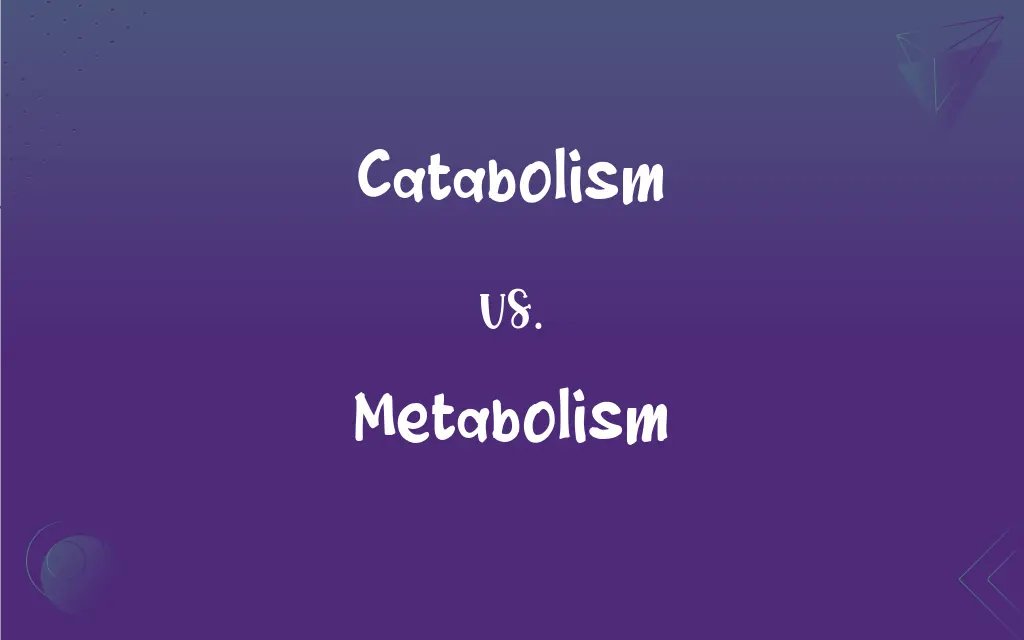Catabolism vs. Metabolism: What's the Difference?
Edited by Janet White || By Harlon Moss || Updated on October 27, 2023
Catabolism refers to the breakdown of complex molecules into simpler ones, releasing energy. Metabolism refers to the sum of all biochemical processes, including catabolism and anabolism, in an organism.

Key Differences
Catabolism is the metabolic process that breaks down complex molecules into simpler ones, releasing energy. Metabolism encompasses this process along with anabolism, the building-up aspect.
Catabolism involves the release of energy, often stored in ATP, through the breakdown of substances. Metabolism, in contrast, refers to the entire range of biochemical processes, energy release, and energy utilization.
The process of catabolism typically leads to the production of waste products that need to be excreted. Metabolism as a whole manages both the creation and elimination of such substances.
In catabolism, large molecules like carbohydrates, fats, and proteins are broken down. Metabolism not only includes these breakdown processes but also the synthesis of necessary compounds.
Catabolism is generally associated with the release and generation of energy. Metabolism balances this with the use of that energy for various bodily functions and activities.
ADVERTISEMENT
Comparison Chart
Part of Speech
Noun
Noun
Word Origin
Greek (katabole)
Greek (metabole)
Plural Form
Catabolisms
Metabolisms
Adjective Form
Catabolic
Metabolic
Derived Terms
Catabolize, Catabolic rate
Metabolize, Metabolic rate
ADVERTISEMENT
Catabolism and Metabolism Definitions
Catabolism
The enzymatic breakdown of substances.
Muscle catabolism can occur during prolonged fasting.
Metabolism
The conversion of food into energy and waste.
Metabolism slows down as one ages, affecting weight.
Catabolism
The metabolic pathway for releasing energy.
Catabolism of fats occurs when the body's glucose levels are low.
Metabolism
The life-sustaining transformations within cells.
Good sleep is essential for healthy metabolism.
Catabolism
The process converting nutrients into waste.
Catabolism is crucial for removing excess nitrogen from proteins.
Metabolism
The chemical processes occurring within a living organism.
A high metabolism helps some people stay naturally slim.
Catabolism
The breakdown of complex molecules in living organisms.
During exercise, catabolism of sugars provides the needed energy.
Metabolism
The set of chemical reactions maintaining living state.
Metabolism plays a role in how medications affect the body.
Catabolism
The destructive phase of metabolism.
Catabolism helps in detoxifying harmful substances in the liver.
Metabolism
The totality of an organism's biochemical processes.
Metabolism includes both energy production and usage.
Catabolism
The metabolic breakdown of complex molecules into simpler ones, often resulting in a release of energy.
Metabolism
The chemical processes occurring within a living cell or organism that are necessary for the maintenance of life. In metabolism some substances are broken down to yield energy for vital processes while other substances, necessary for life, are synthesized.
Catabolism
(biochemistry) Destructive metabolism, usually including the release of energy and breakdown of materials.
Catabolism
The breakdown of more complex substances into simpler ones with release of energy, in living organisms; destructive or downward metabolism; - a form of metabolism, opposed to anabolism. See also Disassimilation.
Catabolism
Breakdown of more complex substances into simpler ones with release of energy
FAQs
What is catabolism?
The breakdown of complex molecules to release energy.
What is metabolism?
The sum of all chemical processes, including catabolism and anabolism, in an organism.
How does metabolism affect body weight?
A faster metabolism can increase energy expenditure, affecting weight.
What triggers catabolic processes?
They are often triggered by energy needs or hormonal signals.
What’s the role of metabolism in health?
It's crucial for energy production, growth, and overall bodily functions.
What’s the relationship between metabolism and exercise?
Exercise can boost metabolism and increase energy expenditure.
Does metabolism only refer to breaking down substances?
No, metabolism includes both breaking down (catabolism) and building up (anabolism).
Can metabolism be altered?
Yes, factors like diet, exercise, and hormones can affect metabolism.
Does catabolism produce or use energy?
It produces energy.
How does age affect metabolism?
Metabolism generally slows down with age.
Can metabolism be measured?
Yes, through methods like basal metabolic rate (BMR) measurement.
Are enzymes involved in catabolism?
Yes, enzymes play a key role in catalyzing catabolic reactions.
Does catabolism occur in all cells?
Yes, catabolic processes are fundamental in all living cells.
What is an example of a catabolic reaction?
The breakdown of glucose during cellular respiration.
Is metabolism the same in all organisms?
The basic principles are similar, but specific metabolic pathways can vary.
What’s the end product of catabolism?
Simple molecules like water, carbon dioxide, and energy-rich compounds.
How does nutrition impact metabolism?
Diet can influence metabolic rate and efficiency.
Are catabolic reactions reversible?
Most are not reversible.
Is catabolism an exergonic process?
Yes, catabolism releases energy.
Can catabolism occur without oxygen?
Yes, some catabolic processes are anaerobic.
About Author
Written by
Harlon MossHarlon is a seasoned quality moderator and accomplished content writer for Difference Wiki. An alumnus of the prestigious University of California, he earned his degree in Computer Science. Leveraging his academic background, Harlon brings a meticulous and informed perspective to his work, ensuring content accuracy and excellence.
Edited by
Janet WhiteJanet White has been an esteemed writer and blogger for Difference Wiki. Holding a Master's degree in Science and Medical Journalism from the prestigious Boston University, she has consistently demonstrated her expertise and passion for her field. When she's not immersed in her work, Janet relishes her time exercising, delving into a good book, and cherishing moments with friends and family.































































